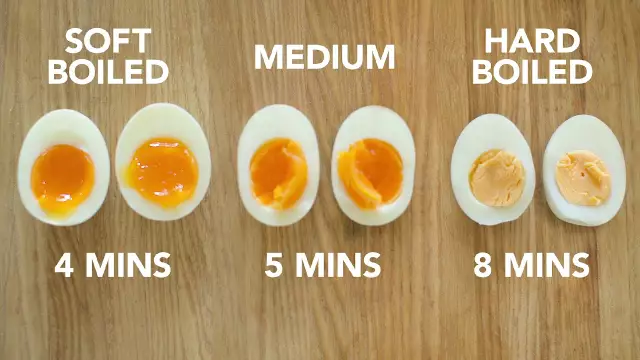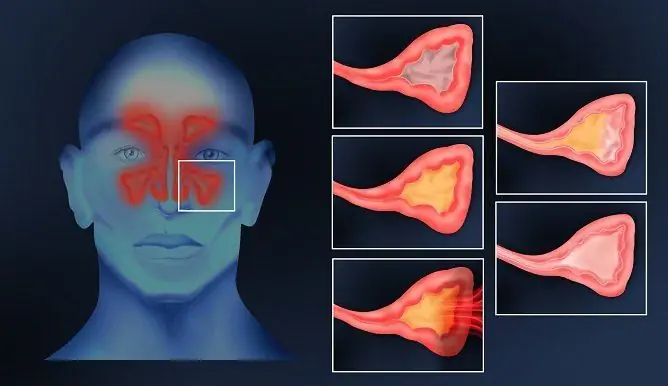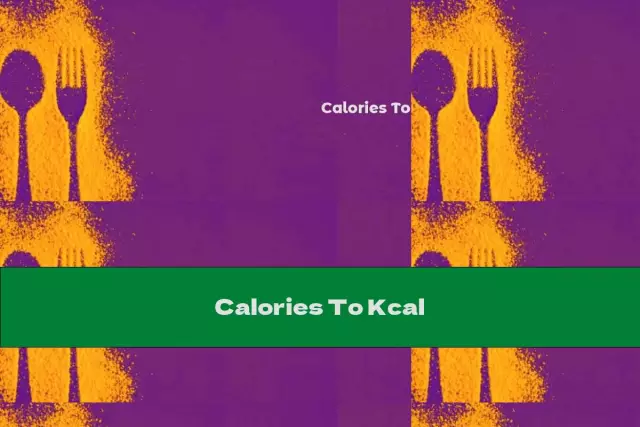- Author Rachel Wainwright wainwright@abchealthonline.com.
- Public 2023-12-15 07:39.
- Last modified 2025-11-02 20:14.
How many calories are in an egg

Knowing the calorie content of foods is important for everyone who is losing weight. All diets, to one degree or another, urge us to control the energy value of food. Since eggs are part of the standard diet of all Russians, the question of how many calories in an egg is of interest to many. It should be noted that nutritionists have an ambiguous attitude towards this product. Someone recommends eggs for weight loss. On their basis, for example, the nutritional system of the endocrinologist Osama Hamdiy was created. Other doctors advise to strictly limit the number of eggs in the diet. There are regular recommendations to reduce their consumption to two pieces a week. In this article we will try not only to answer how many calories are in an egg and egg dishes, but also to discuss the advisability of including these products in the menu when fighting obesity.
How many calories are in eggs of different varieties
Most often, we use chicken eggs (selected, ordinary or small) and quail eggs for food. How many calories are in an egg depends on the variety. Let's take a look at specific examples. Choice chicken egg weighs about 60 grams. Its calorie content is 94-100 kilocalories. An ordinary chicken egg is 50-60 grams in weight. Its calorie content is approximately 78-85 kilocalories in one piece. Small chicken eggs weigh less than 50 grams. Their calorie content per piece is 63-77 kilocalories. You can find out the variety of chicken dietary eggs by looking at the label on the package. Of course, only laboratory research can establish the true calorie content. The data given by us are averaged and fluctuate depending on the season, the breed of the bird, its age, and the composition of feed at the poultry farm. In 100 grams of any chicken egg, there are approximately 157-160 kilocalories. There are even more calories in 100 grams of quail eggs - about 168-170. But the eggs of this variety are much smaller. Their weight is about 9-12 grams. How many calories are in the egg of this bird? No more than 20 kilocalories in one piece. Less commonly, other types of eggs are used in the diet. A duck or goose egg contains 185 kilocalories per 100 grams, a turkey egg - 165 kilocalories, an ostrich - 118 kilocalories. How many calories are in an egg depends primarily on its mass.depends primarily on its mass.depends primarily on its mass.
Calorie content of egg whites and yolks
In the egg, two parts can be clearly distinguished: the white and the yolk. Their composition is radically different in the content of proteins and fats, as well as calories and trace elements. Those who use eggs for weight loss need to know these differences. The yolk is rich in complete animal proteins, fat and cholesterol. It contains about 11.5% fat. Cholesterol in one yolk is 210 mg. Of course, those who are struggling with atherosclerosis are forced to almost completely abandon egg yolk. But if you do not have pronounced problems with blood vessels, then you should not completely abandon this product. The yolk contains a lot of nutrients: omega-3 complex, calcium, folic acid, vitamin D. The calorie content of each chicken egg yolk is approximately 55-65 kilocalories. Protein has very different nutritional properties. It consists of carbohydrates and proteins (albumin). There is practically no fat and cholesterol in protein, which means that it will not be harmful even with the strictest diet. In terms of energy value, this product can be classified as low-calorie. The calorie content of egg white is only 15-20 kilocalories. If we talk about 100 grams of the product, then for the yolk the calorie content is 352 kilocalories, and for the protein - only 45 kilocalories.
Calorie content of soft-boiled and hard-boiled eggs
For cooking, eggs are easiest to boil. The boil time determines whether the egg is soft-boiled or hard-boiled. The calorie content of the product is almost the same in both cases. The calorie content of a hard-boiled egg is 160 kilocalories per 100 grams. The calorie content of soft-boiled eggs is almost the same - 157-159 kilocalories per 100 grams of product. The longer the egg has been cooked, the longer it will take to digest it in the gastrointestinal tract. In addition, hard-boiled eggs can last longer. The assimilation of nutrients in any case remains high.
Calories in a fried egg

Fried eggs are much more nutritious than raw or boiled eggs. This is because fat (oil or butter) is used in this cooking method. All oils are extremely nutritious foods. Vegetable oil (including olive oil) is considered the record holder for calories. In 100 grams, it contains about 900 calories. This is so much that it significantly exceeds the energy value of mayonnaise, bacon, chocolate and sugar. Fried eggs per 100 grams contains 240 calories. This is one third more than raw or boiled eggs. The omelet is made from eggs with the addition of milk, cream, flour, cheese. Its calorie content can be 200-350 kilocalories. The calories in a fried egg are often overkill in any dietary system.
Egg powder
The calorie content of egg powder is extremely high. This product contains about 542 kcal per 100 grams. Of course, we never eat this product in large quantities and in pure form. Otherwise, soon all of us faced the acute problem of obesity. The calorie content of dry egg whites and yolks also varies greatly. There are approximately 336 calories in 100 grams of protein powder. This is a lot, but still much less than in dry yolks. Their calorie content is almost 625 kilocalories per 100 grams.
Slimming eggs
Some diets use eggs for weight loss. First of all, we are talking about low-carb diets. These diets are based on modern metabolic concepts. With the exclusion of carbohydrates, we start the processes of breaking down fat. As a result, ketone bodies appear in the blood, which help suppress appetite. Eggs can also be used in low-calorie diets. The calorie content of hard-boiled and soft-boiled eggs makes these foods dietary. Their energy value per serving is small. And the feeling of fullness comes for a long time. Eggs are among the sources of valuable vitamins and minerals. Moreover, these substances are absorbed from eggs very well. A chicken egg per 100 grams contains: phosphorus - 192 milligrams, potassium - 140 milligrams, sodium - 134 milligrams, calcium - 55 milligrams, magnesium - 12 milligrams, iron - 2,5 milligrams, copper 83 micrograms, cobalt 10 micrograms. All of these substances are especially needed to maintain health for those who are constantly struggling with excess weight through various unbalanced diets. However, the abuse of eggs can lead to undesirable consequences. This is especially true for those whose cholesterol levels, according to blood biochemistry, exceed normal values. Therefore, eggs for weight loss should be used only with good blood biochemistry tests.whose cholesterol level according to blood biochemistry exceeds normal values. Therefore, eggs for weight loss should be used only with good blood biochemistry tests.whose cholesterol level according to blood biochemistry exceeds normal values. Therefore, eggs for weight loss should be used only with good blood biochemistry tests.
Found a mistake in the text? Select it and press Ctrl + Enter.






